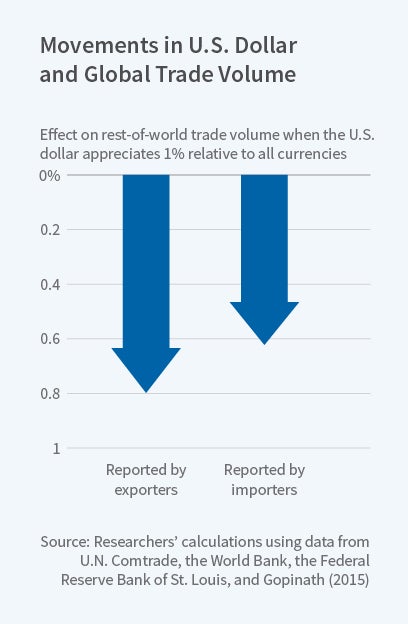Evaluating the US Dollar's Outsized Role in World Trade
Recognizing that many goods are priced in dollars affects estimates of exchange rate pass-through and the elasticity of trade with respect to the exchange rate.
Fluctuations in the dollar reverberate through global trade, and even affect transactions that do not involve the United States.
Because of the prevalence of invoice pricing in dollars, changes in the value of the dollar can have a larger impact on the trade flows between two non-U.S. nations involved in bilateral trade than changes in their own currencies.
In Global Trade and the Dollar (NBER Working Paper No. 23988), Emine Boz, Gita Gopinath, and Mikkel Plagborg-Møller analyze annual trade price and volume data for 55 countries from 1989-2015. As of 2015, the sample studied accounted for 91 percent of the world's total exports and imports of goods.
The researchers focus on estimates of the degree of price pass-through and the elasticity of trade with respect to the exchange rate.
When they do not control for fluctuations in the value of the dollar, they find that a 10 percent depreciation in the currency of an importing nation relative to that of its exporting counterpart raises the importer's prices by 8 percent, suggesting an almost complete pass-through. Adding the exchange rate of the importing country relative to the dollar dramatically reduces the pass-through estimate, to 3.2 percent. The dollar, by comparison, becomes the dominant factor with a pass-through estimate of 6.6 percent into import prices. The researchers also calculate that a 10 percentage point rise in the share of imports invoiced in dollars would increase the dollar pass-through by 2 to 3.5 percentage points.
When the dollar's value changes, it affects the total volume of global trade, even among trading partners that do not include the United States. A 1 percent appreciation of the dollar against all other currencies is associated with a 0.6 to 0.8 percent decline in total trade among countries in the rest of the world.
The researchers further find that the greater the share of a nation's imports invoiced in dollars, the greater the spillover effect on its inflation rate from shifts in the dollar's value. The share of imports invoiced in dollars varies widely among countries — for example, from 13 percent for Switzerland to 59 percent for Turkey and 88 percent for Argentina. Countries with less import volume invoiced in dollars are more insulated from fluctuations in the dollar.
The researchers explore whether the euro has effects similar to those of the dollar and find that it does not. "Euro pass-through into prices is negligible on average, while the dollar pass-through remains high when we control for the euro," the researchers conclude.
— Steve Maas



